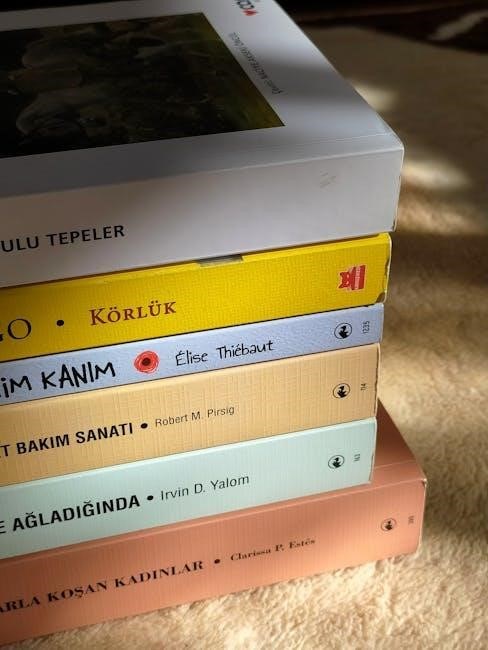
iliad pdf robert fagles
The Iliad‚ an ancient Greek epic poem attributed to Homer‚ explores the legendary Trojan War‚ focusing on Achilles’ rage and its profound consequences. Renowned translator Robert Fagles offers a poetic and accessible rendition‚ preserving the original’s grandeur while engaging modern readers. His translation‚ widely acclaimed for its lyrical precision‚ is complemented by Bernard Knox’s insightful introduction and notes‚ enhancing the text’s depth and context.
Overview of the Iliad as an Ancient Greek Epic Poem
The Iliad‚ an ancient Greek epic poem attributed to Homer‚ is a cornerstone of classical literature. Composed around 800 BCE‚ it captures the legendary Trojan War‚ focusing on Achilles’ rage and its far-reaching consequences. The poem explores themes of honor‚ glory‚ and human destiny‚ set against the backdrop of divine intervention. Its structure‚ divided into 24 books‚ follows a rhythmic dactylic hexameter‚ creating a majestic narrative flow. The Iliad delves into the complexities of war‚ the psychology of its heroes‚ and the inevitability of fate. As a foundational text of Western literature‚ it has inspired countless adaptations and interpretations‚ remaining a timeless exploration of human nature and conflict.

Robert Fagles: A Renowned Translator of Classical Literature
Robert Fagles‚ a distinguished scholar and translator‚ is celebrated for his masterful renditions of ancient Greek and Roman texts. As a Princeton University professor emeritus‚ Fagles dedicated his career to bridging the gap between classical literature and modern audiences; His translations of Homer’s Iliad and Odyssey‚ as well as Virgil’s Aeneid‚ are acclaimed for their poetic beauty and fidelity to the original works. Fagles’ unique ability to balance scholarly precision with lyrical expression has made his translations accessible to a broad readership. His work has been recognized with numerous awards‚ including the National Humanities Medal‚ solidifying his legacy as one of the most influential classical translators of his time. His translations continue to be widely studied and admired‚ ensuring the enduring relevance of ancient literature in contemporary times.

Structure and Content of the Iliad PDF
The Iliad PDF‚ translated by Robert Fagles‚ is divided into 24 books‚ focusing on the Trojan War’s final weeks. It explores themes like honor‚ wrath‚ and fate‚ with detailed battles and emotional depth. The PDF includes Bernard Knox’s insightful introduction‚ providing historical context and analysis. Maps of Homeric geography enhance understanding of the setting. The text is supported by extensive notes‚ aiding comprehension of complex references. Bibliographical references are included for further academic exploration. This structured format ensures accessibility for both casual readers and scholars‚ making it a comprehensive resource for studying Homer’s epic masterpiece.
Bernard Knox’s introduction and notes in the Iliad PDF are instrumental in enriching the reader’s understanding of Homer’s epic. Knox‚ a distinguished classicist‚ provides a profound historical and literary context‚ bridging the gap between ancient and modern perspectives. His introduction offers insights into the cultural and historical backdrop of the Trojan War‚ while his notes clarify complex references and nuances within the text. Knox’s commentary is both scholarly and accessible‚ making the Iliad more approachable for contemporary readers. His analysis highlights themes‚ character motivations‚ and the poetic techniques employed by Homer‚ ensuring a deeper appreciation of the epic’s artistry. This comprehensive support transforms the Iliad PDF into an invaluable resource for both casual readers and academic scholars‚ enhancing the overall reading experience.
Inclusion of Maps and Homeric Geography
The Iliad PDF includes detailed maps that enhance the reader’s understanding of Homeric geography. These visual aids depict the ancient Greek world‚ highlighting key locations like Troy‚ the Aegean region‚ and the cities of Greek heroes. The maps provide spatial context‚ illustrating the movements of armies‚ the layout of battlefields‚ and the homelands of major characters. This geographical clarity helps modern readers grasp the epic’s setting and the strategic importance of various sites. By visualizing the world of the Iliad‚ the maps bridge the gap between ancient and modern perspectives‚ making Homer’s narrative more accessible and engaging. They are especially useful for tracking the journeys of heroes like Achilles and Hector‚ offering a tangible connection to the epic’s legendary landscapes.
Bibliographical References and Academic Sources
The Iliad PDF by Robert Fagles is complemented by extensive bibliographical references and academic sources‚ ensuring scholarly rigor. These references include classic studies on Homer‚ historical analyses of ancient Greek warfare‚ and linguistic explorations of the epic’s language. Fagles’ translation is supported by modern scholarship‚ providing readers with a well-rounded understanding of the text’s historical and cultural context. The inclusion of these sources makes the work a valuable resource for both casual readers and academics. Bernard Knox’s introduction further enriches the edition‚ offering insights into the poem’s themes and significance. These academic references ensure that Fagles’ translation remains accessible while maintaining its intellectual depth‚ making it a trusted resource for studying the Iliad in depth.
Key Themes and Characters in the Iliad
The Iliad explores themes of rage‚ pride‚ and honor through characters like Achilles‚ whose wrath drives the narrative. Hector embodies duty and sacrifice‚ while themes of glory‚ fate‚ and moral complexity resonate throughout the epic‚ highlighting the human condition in warfare.
The Struggle Between Achilles and Hector

The clash between Achilles and Hector forms the emotional core of the Iliad‚ symbolizing the tragic essence of war. Achilles‚ driven by rage and pride‚ seeks vengeance against Hector‚ who embodies honor and duty. Their duel is a pivotal moment‚ highlighting the human cost of conflict. Fagles’ translation vividly captures the tension‚ portraying Achilles’ relentless fury and Hector’s noble resignation. This struggle not only defines their characters but also underscores the futility of war‚ as both heroes fall victim to fate and pride. The emotional depth of their confrontation resonates deeply‚ making it one of the most profound explorations of human conflict in literature.
The Concept of Honor and Glory in Ancient Greek Warfare
Honor and glory are central themes in the Iliad‚ reflecting the societal values of ancient Greek warriors. These concepts drove heroes to excel in battle‚ as their reputation and legacy depended on their bravery. Achilles’ rage stems from his dishonor at the hands of Agamemnon‚ illustrating the profound importance of recognition. Hector‚ too‚ fights to protect his city and family‚ embodying the ideal of honor through duty. Fagles’ translation captures the nuances of these themes‚ highlighting how honor was both a personal and collective pursuit. The pursuit of glory often led to tragic consequences‚ as seen in the devastating losses of war. Through this lens‚ the Iliad explores the complexities of human ambition and the enduring quest for renown.
The Role of the Gods in Shaping Human Destiny
The gods in the Iliad play a pivotal role in shaping human destiny‚ often intervening in mortal affairs to further their own agendas or protect their favored heroes. Zeus‚ as the king of the gods‚ frequently balances the scales of war‚ while Athena and Apollo actively influence the outcomes of battles. Their divine interventions highlight the fragile nature of human control over fate. Fagles’ translation captures the intricate dynamics between gods and mortals‚ emphasizing how divine will often overrides human ambition. The characters’ reliance on omens and prophecies underscores the belief that their lives are ultimately governed by the gods. This divine influence adds depth to the epic‚ illustrating the complexities of fate and free will in ancient Greek thought.

Robert Fagles’ Contribution to Classical Scholarship
Robert Fagles’ celebrated translations of ancient texts‚ including the Iliad‚ have bridged the gap between classical literature and modern readers‚ balancing poetic style with accessibility‚ profoundly influencing education and contemporary interpretations.
Fagles’ Translation Style and Poetic Approach
Robert Fagles’ translation of the Iliad is renowned for its poetic vibrancy and fidelity to Homer’s original text. His style masterfully balances rhythm and meaning‚ capturing the epic’s grandeur while remaining accessible to modern readers. Fagles employs a free-verse approach‚ avoiding rigid meter but preserving the musicality of the ancient Greek. His diction is both elevated and natural‚ conveying the intensity of battle scenes and the depth of human emotion. By avoiding archaic language‚ Fagles ensures the text resonates with contemporary audiences‚ making the Iliad feel both timeless and immediate. His poetic approach not only honors Homer’s vision but also reimagines it for a new generation‚ ensuring the epic’s enduring relevance.
His Work on Other Classical Texts‚ Including the Odyssey
Robert Fagles’ contributions to classical literature extend far beyond the Iliad. His acclaimed translation of Homer’s Odyssey further cemented his reputation as a master translator. Fagles’ rendering of the Odyssey captures the epic’s adventurous spirit and lyrical beauty‚ balancing fidelity to the original with a modern‚ accessible voice. Beyond Homer‚ Fagles translated other seminal works‚ such as Sophocles’ Oedipus Rex and Virgil’s Aeneid‚ demonstrating his versatility and dedication to classical scholarship. His translations are celebrated for their poetic precision and emotional depth‚ making ancient texts resonate with contemporary readers. Fagles’ work bridges the gap between antiquity and modernity‚ ensuring the enduring legacy of classical literature.

Awards and Recognition for His Translations
Robert Fagles’ translations have earned him numerous accolades‚ solidifying his stature as a leading figure in classical scholarship. His rendition of the Iliad was celebrated for its lyrical precision and emotional depth‚ garnering widespread critical acclaim. Fagles received the Academy Award in Literature from the American Academy and Institute of Arts and Letters for his contributions to translating classical texts. Additionally‚ he was awarded the PEN/Ralph Manheim Medal for Translation‚ recognizing his exceptional work in making ancient literature accessible to modern audiences. His translations are praised for their ability to preserve the original poetic intent while resonating with contemporary readers. Fagles’ work continues to be a benchmark for excellence in the field of classical translation.
The Impact of Fagles’ Translation on Modern Readers
Robert Fagles’ translation of the Iliad has revitalized interest in classical literature‚ offering a fresh‚ accessible interpretation that resonates with contemporary readers while preserving the epic’s timeless depth.
Accessibility of Classical Literature to a Broader Audience


Robert Fagles’ translation of the Iliad has played a pivotal role in making classical literature more accessible to modern readers. His poetic yet clear language bridges the gap between ancient Greek traditions and contemporary understanding‚ ensuring the epic’s themes resonate widely. The inclusion of maps and Bernard Knox’s insightful introduction further enhances readability‚ providing historical and cultural context. Fagles’ work has introduced the Iliad to a diverse audience‚ including students and general readers‚ fostering a deeper appreciation for ancient Greek literature. By balancing fidelity to the original text with modern readability‚ Fagles’ translation has become a cornerstone in both academic and casual exploration of the Iliad‚ ensuring its timeless story reaches new generations.

Use in Academic and Educational Settings
Robert Fagles’ translation of the Iliad is widely utilized in academic and educational contexts‚ serving as a cornerstone for classical studies. Its clarity and poetic fidelity make it an ideal resource for students and scholars alike. The inclusion of Bernard Knox’s introduction and notes provides essential historical and literary context‚ aiding in deeper analysis. Maps of Homeric geography further enhance understanding‚ particularly for those unfamiliar with ancient Greek settings. Fagles’ work is frequently incorporated into university curricula‚ enabling students to engage with the epic’s themes and complexities. Its accessibility ensures that the Iliad remains a vital tool for teaching classical literature‚ fostering a connection between ancient texts and modern learners. This translation has become indispensable in education‚ bridging the gap between scholarship and student engagement.
Influence on Contemporary Adaptations and Interpretations

Robert Fagles’ translation of the Iliad has profoundly influenced contemporary adaptations and interpretations of ancient Greek literature. His poetic yet accessible rendering has inspired filmmakers‚ playwrights‚ and authors to reimagine the epic tale for modern audiences. Fagles’ work has been referenced in literary adaptations‚ such as novel retellings of the Trojan War‚ and has shaped the way the Iliad is portrayed in popular culture. His translation’s vivid language and emotional depth have also influenced scholarly interpretations‚ encouraging new perspectives on the text. By bridging ancient and modern sensibilities‚ Fagles’ Iliad continues to inspire creative and academic reinterpretations‚ ensuring the epic’s enduring relevance in contemporary culture. His work remains a foundational resource for artists and scholars seeking to engage with Homer’s timeless masterpiece.
Robert Fagles’ Iliad remains a landmark achievement‚ blending poetic elegance with scholarly precision. His work has redefined classical literature’s accessibility‚ ensuring its timeless relevance for modern readers;
The Enduring Relevance of the Iliad in Modern Times
The Iliad remains a timeless masterpiece‚ resonating with universal themes such as human nature‚ conflict‚ and leadership. Its exploration of emotions‚ morality‚ and the complexities of war continues to captivate modern audiences. Fagles’ translation ensures that these ancient insights are accessible‚ bridging the gap between antiquity and contemporary life. The epic’s focus on individual and collective struggles reflects enduring questions about honor‚ duty‚ and the human condition. Its influence is evident in literature‚ art‚ and film‚ proving its relevance across millennia. Through Fagles’ work‚ the Iliad continues to inspire new generations‚ offering profound reflections on the essence of humanity and the consequences of war.
Fagles’ Role in Preserving and Promoting Ancient Greek Literature
Robert Fagles played a pivotal role in preserving and promoting Ancient Greek literature through his extraordinary translations. His work on the Iliad and Odyssey ensured that these timeless epics remained accessible to modern readers while maintaining their poetic and historical integrity. Fagles’ translations are celebrated for their balance between fidelity to the original text and readability in contemporary English. By making classical works more approachable‚ he inspired a new generation of scholars and enthusiasts to engage with Ancient Greek literature. His contributions have been instrumental in keeping the legacy of Homer and other classical authors alive‚ fostering a deeper appreciation for the cultural and historical significance of these texts in today’s world.